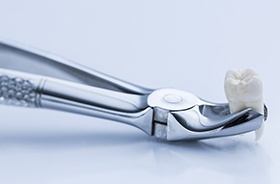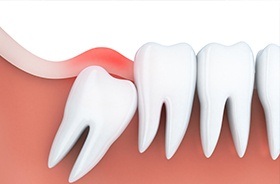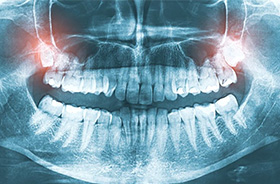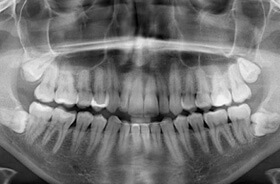
Wisdom Tooth Extractions – New Haven, CT
Complete Wisdom Tooth Care Under One Roof

Are you experiencing a dull but persistent pain toward the back of your jaw? If so, and if you have not had your wisdom teeth out, then they are likely to blame! The wisdom teeth are the most often extracted, and that is because the average person just does not have enough room for them in their mouth. At New Haven Dental Group, we are able to offer complete wisdom tooth care under one roof, saving our patients from having to visit an expensive specialist.
Why Choose New Haven Dental Group
for Wisdom Tooth Extractions?
- Sedation dentistry options available
- Able to Remove Impacted Wisdom Teeth
- Compassionate & Highly Skilled Care
What Are Wisdom Teeth?

Due to the rough diet of our ancient ancestors, they needed an extra set of molars, and these are called the wisdom teeth. They are usually the last to come in, normally appearing when a person is in their late teens or early twenties. As cooking techniques have improved and food has become easier to eat, the human jaw has shrunk over time, meaning the wisdom teeth literally do not fit in most people’s mouths. This leads them to cause all kinds of problems as they struggle to come in.
Why Do Wisdom Teeth Need to Be Removed?

It is important to note that the wisdom teeth do not always need to be removed; some people can retain their third molars for a lifetime with no adverse effects. More often, though, they should be extracted because they have the potential to cause a number of serious oral health complications, including:
- Decay and gum disease. Due to their location and position, it can be difficult for some people to clean around their wisdom teeth, leading to a greater risk of cavities and gum infections.
- Cysts and tumors. These can form in the tissue around the wisdom teeth and cause great discomfort.
- Dental misalignment. As they attempt to erupt from the jawline, the wisdom teeth may push against nearby teeth, gradually moving them out of place and causing bite problems in the process.
What to Expect from the Wisdom Teeth Procedure

If a wisdom tooth is fully erupted above the gumline, removing it should be a straightforward process. After numbing your mouth, we may lift the tooth with an instrument known as an elevator. Then, we can grip the tooth with forceps and gently remove it from the mouth.
If a tooth is impacted (stuck beneath the gumline), things can get a bit more complicated. We may need to create incisions in your gums or break the tooth into pieces in order to successfully remove it.
Recovering From Wisdom Teeth Extraction

Some discomfort, soreness, swelling, and mild bleeding are normal after wisdom teeth extractions. Here are some tips to facilitate a smooth recovery:
- Stick to a soft diet.
- Do not smoke.
- Do not use a drinking straw.
- Keep your head propped up on pillows when you are sleeping.
- Do not touch your extraction sites with your tongue, fingers, or toothbrush during the first few days of recovery.
- Take any medications as recommended by our team.
- Give us a call if you run into any questions or concerns.
Understanding the Cost of Wisdom Tooth Extractions

The cost of wisdom tooth extractions depends on a few different factors, such as how many teeth need to be removed, the type of impaction present, and more. During your consultation, we can share some specific numbers with you. We will also make sure you understand your payment options, such as insurance and financing. You can rely on us to take every reasonable measure to help you navigate the financial aspect of your treatment.
Factors That Can Impact the Cost of Wisdom Tooth Extractions

Some factors that can have an effect on the cost of wisdom tooth extractions include:
- The number of teeth that need to be removed. Most people develop four wisdom teeth, but a percentage of people have more or fewer. Some people choose to get all of their wisdom teeth removed at once, and others choose only to remove the teeth that are currently causing problems.
- The type of impaction present. Wisdom teeth may be fully erupted, but more often, they are impacted (stuck beneath the gumline). They may be lodged in either the jawbone or the soft tissue. The type of impaction present can affect the details of your procedure and its total cost.
- The type of sedation used. Our practice offers multiple types of sedation, each of which comes at a different price point. Sedation is not always required for relatively simple tooth extractions; in some cases, we only use local anesthesia.
- The doctor who performs your procedure. Our team can perform the vast majority of wisdom tooth extractions in-house. If we must refer you to an outside specialist, you can expect a different pricing structure.
Does Dental Insurance Cover Wisdom Tooth Extractions?

Very often, dental insurance does cover the cost of wisdom tooth extractions. The procedure is usually classified as a major service, so around 50% of its cost may be covered, up to the amount of your plan’s annual maximum. Our practice welcomes insurance, and we are even in-network with many popular plans. We will do all we can to help you understand how your benefits apply and use them in an advantageous manner.
Other Options for Making Wisdom Tooth Extractions Affordable

Aside from insurance, there are a few provisions that could make it easier for you to afford your procedure:
- We accept third-party financing through both CareCredit and Sunbit.
- The Essential Dental Plan. This discount arrangement may enable you to enjoy reduced fees on virtually all of the services available in our practice.
Are you eager to learn more about wisdom tooth extractions and their cost? Get in touch with New Haven Dental Group today!
Wisdom Tooth Extractions FAQs

Our New Haven team is ready to help patients find freedom from the complications that can come with wisdom teeth. Prior to visiting us for a consultation, however, you might be interested in learning more about your third molars and the extraction process. Below, you will find answers to a number of relevant FAQs. If your specific questions are not included here, reach out to us directly. Our team will be happy to speak with you.
Why Do We Have Wisdom Teeth?
Many experts agree that the reason for the existence of wisdom teeth is related to the diet of ancient human ancestors. They ate a rough diet, which included a lot of tough meats, nuts, seeds, and similar items. Their teeth experienced a lot of wear and tear, and a third set of molars was necessary for them to feed their bodies.
Thanks to modern innovations in food preparation and processing, the wisdom teeth are no longer necessary. In fact, some people never develop any wisdom teeth at all!
Does Everyone Have Wisdom Teeth?
Most people develop four wisdom teeth, one in each quadrant of their mouth. However, some individuals develop more or fewer. In fact, a study published in 2015 estimates that between 5% and 37% of people are missing at least one of their wisdom teeth.
If you do not see any wisdom teeth in your mouth, that does not necessarily mean you do not have them. If you are young, they simply may not have formed yet. If you are an adult, it is possible that your wisdom teeth are still beneath your gumline. An X-ray can reveal for sure whether you have them.
How Do You Make Wisdom Teeth Pain Go Away?
The only long-term solution for wisdom tooth pain is to get them removed. Before your extraction appointment, though, there may be some steps you can take to reduce your discomfort:
- Take appropriate doses of aspirin, ibuprofen, or another over-the-counter pain reliever.
- Apply ice wrapped in a towel to the outside of your cheek for 20 minutes at a time.
- Regularly rinse your mouth with a solution of a teaspoon of salt dissolved into a cup of warm water.
- Eat a soft, easy to chew diet.
- Keep the area around your wisdom teeth as clean as possible via thorough brushing and flossing.
Is Wisdom Tooth Removal Painful?
Thanks to modern dental techniques, the wisdom tooth removal procedure is fairly comfortable. Your mouth will be numbed, so you may feel very little during your appointment.
After the local anesthesia wears off, you can expect to experience some soreness, swelling, and other symptoms. Most people are fully recovered within a week or two of their procedure. In the meantime, you should take steps to care for your mouth. For example, you should eat a soft diet, take pain medication, get plenty of rest, and more. Our team will provide detailed post-op instructions before you leave our office.